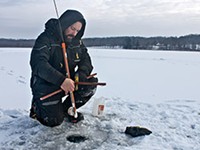[
{
"name": "500x250 Ad",
"insertPoint": "5",
"component": "15667920",
"parentWrapperClass": "",
"requiredCountToDisplay": "1"
}
]
Ridge Mahoney has been watching the development of Major League Soccer since its inception in 1996. As the senior editor of Soccer America magazine, he's seen teams come into the league and succeed, and he's seen other expansion teams suffer major flame-outs.
So what does he think about Rochester's chances of landing an MLS franchise?
Quite simply, Mahoney says, MLS has become too big for a smaller city like Rochester. "[MLS is] starting to attract some of the major players in the American sports world, and frankly, that's not where Rochester is," he says. "[League finances] are looking better than they were four years ago. They can afford to be a little more selective."
Reports by the Associated Press following last season show MLS still operating in the red, but with its financial losses shrinking and individual teams starting to actually make money. Average attendance at MLS games has been growing, albeit slowly, since hitting a low in 2000. As a result, the league added two more teams this season, Real Salt Lake and Chivas USA, and it plans to add two more in 2007.
That's where Rochester comes in. The Rhinos have had major-league aspirations since the late 1990s. And those ambitions, says Rhinos spokesman Chris Bandura, are the primary reason for the construction of its new soccer-specific stadium downtown.
After some fluctuation, the total cost of the stadium is now being pegged around $40 million. So far, $15 million of that has been picked up by the state, and another $3 million by the city. Then the Rhinos announced recently that they're seeking another $15 million in state money. The team hired Excelsior Advocates, LLC, a high-profile, Albany-based lobbying firm to push for the funding.
But what if visions of an MLS invitation are really a pipe dream? Even with a new stadium, Mahoney says, Rochester could lose out on the expansion lottery, especially if larger cities start building their own soccer stadiums. The Rhinos' acceptance, he says, "depends on what happens with other teams, not necessarily what [the Rhinos] do. They're just not really high on MLS's list."
Why did Rochester think it had a chance to begin with? Sure, during the last decade the Rhinos have been one of the country's most successful minor-league soccer teams. And sure, there's tremendous fan support here in Rochester; attendance routinely tops five figures, and the Rhinos have outdrawn several MLS teams in the past, including Dallas last year.
But Rochester's a pipsqueak compared to the MLS big boys. As of 2000, the Rochester-metro area included roughly 1.1 million people, below the populations of nearly every MLS city. Rochester's also smaller than many of the other cities being mentioned as possible expansion sites: Seattle, Cleveland, Toronto, Philadelphia, San Antonio, St. Louis, Phoenix, and Houston.
That situation won't get any better for Rochester, either. The region's growth rate is an expansion-hopeful low of 3.5 percent. Why would MLS choose Rochester over, say, Seattle, which has about 3 million people and a growth rate of 18.9 percent? Or Toronto, with 4.7 million people and a 9.9 percent growth rate? Or even San Antonio, with 1.7 million people and growing at a 21.6 percent clip?
There are other problems with Rochester's bid. The Rhinos' pockets may not be deep enough to swim with the big fish in MLS. DuRoss has money, but compared to Real Salt Lake owner Dave Checketts --- the sports and media impresario who formerly ran the New York Knicks, Madison Square Garden, Sports Capital Partners, and other companies --- he's a relative minnow.
It was Checketts who, in a matter of months, almost single-handedly engineered the bid that earned Salt Lake City the league's latest expansion franchise. As a result, Salt Lake --- population 969,858, growth rate 26.1 percent --- just might be the prototype for any expansion hopefuls that follow.
Major League Soccer's first choice for the league's 12th franchise was Cleveland. But when that city couldn't put its bid together on time, Checketts created Real Salt Lake.
As evidence that the league really, really wants financial studs like Checketts on board, Salt Lake City landed a team before the city had its own soccer-specific stadium. (Plans are underway for a $60 million structure, but for now RSL will play at the University of Utah's Rice-Eccles Stadium.) By contrast, MLS officials have repeatedly stated that Rochester won't be seriously considered until the city has its own soccer stadium.
"Everybody was surprised," says James Edward, Real Salt Lake beat writer for the Deseret Morning News in Salt Lake City. "Salt Lake really wasn't mentioned as a possibility. Most people were surprised with how quickly it happened."
MLS Commissioner Don Garber "liked what Checketts brought to the table," Edward says. "You really need someone who can put up the money upfront."
So far, Edward says, the response to RSL has been overwhelming. Local print, radio, and TV media have given the team almost saturation coverage, he says, and attendance for the squad's first two games averaged about 20,000.
Of course, with the NBA's Utah Jazz and the University of Utah's hoops team done for the season, and with college football season still months away, RSL isn't competing for fans and dollars right now. So how will the team fair down the road?
"That's the real question," Edward says. But, he says, "There's a lot of soccer fans out here."
Others, however, aren't so sure. In a February 3 editorial, Salt Lake City Weekly editor Ben Fulton dissed RSL's chances of survival. "... [Y]ou can already feel our city's tepid enthusiasm for soccer freezing over," he wrote. "... no one's talking about their impending excitement of soccer itself."
In an interview with City, Fulton said Salt Lake leaders remain confident there's enough community enthusiasm for soccer to support RSL. But he's not buying it. RSL, he says, probably won't survive and surely won't justify the construction of a $60 million stadium.
There's another difference between Rochester and Salt Lake City: by almost all accounts, Rochester boasts a thriving, fervent population of soccer fans. And that, says the Rhinos' Bandura, will be enough for the city to overcome any negatives it might have. Rochester, he says, "is exactly along the lines of what Major League Soccer is looking for."
Size, he says, doesn't always matter. As Rhinos backers have been doing for years, Bandura points to the NFL's Green Bay Packers as an example of a pro franchise that has thrived despite a low regional population.
The Rhinos draw legions of fans from outside Rochester, Bandura says, which helps the team routinely post average attendance figures of more than 10,000. "Rochester kind of stands on its own," he says. "If you can have 10,000 or 12,000 people come to every game, it's going to open some eyes." (Last year's average attendance was 10,181, with a top draw of 12,707. And the team attracted 14,426 for an exhibition game against MLS's DC United and teen phenom Freddy Adu.)
The Rhinos have always received stellar media support, Bandura says, and the construction of PAETEC Park proves to MLS officials that Rochester is serious. "We have the organizational structure to make it work," he says. "The stadium solidifies our seriousness."
But do the Rhinos have enough financial clout? Despite its latest requests from the state, DuRoss and the team wouldn't be making their bid for MLS if they weren't able to come through money-wise, Bandura says. While Rochester might not have the financial resources of, say, MLS' Colorado Rapids, he says, the Rhinos do have one of the biggest payrolls in the United Soccer Leagues.
When it comes down to MLS's choices for new teams, Bandura says, "there's a lot of factors involved." As such, Rochester shouldn't be counted out just because it's a smaller city or because DuRoss isn't a zillionaire.
Even the skeptical Mahoney of Soccer America acknowledges that Rochester's heavy fan support presents a considerable advantage for the city. "MLS knows what they're getting with Rochester," he says.
Major League Soccer is non-committal. "Rochester's chances," says MLS director of media relations Simon Borg, "are as good as any other expansion market."
All along, Borg says, MLS has been looking for three things in expansion teams: a committed local owner, a soccer-specific stadium, and a market to support the team.
"Obviously," he says, "Rochester has some of those things already taking place. MLS will be monitoring the situation."
But the city, the Rhinos, and their fans might need to prepare themselves for a depressing but very possible development: that MLS will pass Rochester over, at least with the 2007 expansion and perhaps further down the road.
That would leave us with a $40 million stadium that failed to achieve its primary purpose: landing Rochester a major-league sports team.
Speaking of Major League Soccer, Rhinos
-
Reader feedback 11.24.04
Nov 24, 2004 -
Reader feedback 10.1.03
Oct 1, 2003 -

Is PaeTec Park on solid ground?
Sep 10, 2003 - More »
Latest in Sports
More by Ryan Whirty
-
RECREATION: Adult kickball leagues in Rochester
Jul 29, 2009 -
RECREATION: Changing Lanes
Oct 29, 2008 -
Lady Tribunes eye fourth consecutive national title
Jan 17, 2007 - More »






